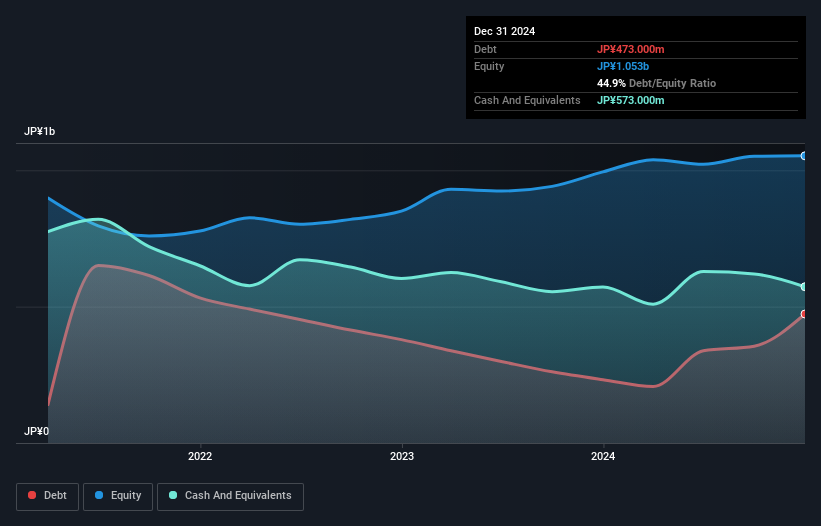Some say volatility, rather than debt, is the best way to think about risk as an investor, but Warren Buffett famously said that 'Volatility is far from synonymous with risk.' So it might be obvious that you need to consider debt, when you think about how risky any given stock is, because too much debt can sink a company. Importantly, infoNet inc. (TSE:4444) does carry debt. But the more important question is: how much risk is that debt creating?
What Risk Does Debt Bring?
Debt is a tool to help businesses grow, but if a business is incapable of paying off its lenders, then it exists at their mercy. If things get really bad, the lenders can take control of the business. While that is not too common, we often do see indebted companies permanently diluting shareholders because lenders force them to raise capital at a distressed price. By replacing dilution, though, debt can be an extremely good tool for businesses that need capital to invest in growth at high rates of return. The first thing to do when considering how much debt a business uses is to look at its cash and debt together.
What Is infoNet's Net Debt?
As you can see below, at the end of December 2024, infoNet had JP¥473.0m of debt, up from JP¥232.0m a year ago. Click the image for more detail. However, its balance sheet shows it holds JP¥573.0m in cash, so it actually has JP¥100.0m net cash.

How Healthy Is infoNet's Balance Sheet?
We can see from the most recent balance sheet that infoNet had liabilities of JP¥434.0m falling due within a year, and liabilities of JP¥399.0m due beyond that. Offsetting this, it had JP¥573.0m in cash and JP¥372.0m in receivables that were due within 12 months. So it can boast JP¥112.0m more liquid assets than total liabilities.
This short term liquidity is a sign that infoNet could probably pay off its debt with ease, as its balance sheet is far from stretched. Simply put, the fact that infoNet has more cash than debt is arguably a good indication that it can manage its debt safely.
Check out our latest analysis for infoNet
It is just as well that infoNet's load is not too heavy, because its EBIT was down 41% over the last year. When a company sees its earnings tank, it can sometimes find its relationships with its lenders turn sour. There's no doubt that we learn most about debt from the balance sheet. But you can't view debt in total isolation; since infoNet will need earnings to service that debt. So if you're keen to discover more about its earnings, it might be worth checking out this graph of its long term earnings trend .
But our final consideration is also important, because a company cannot pay debt with paper profits; it needs cold hard cash. While infoNet has net cash on its balance sheet, it's still worth taking a look at its ability to convert earnings before interest and tax (EBIT) to free cash flow, to help us understand how quickly it is building (or eroding) that cash balance. During the last three years, infoNet produced sturdy free cash flow equating to 72% of its EBIT, about what we'd expect. This free cash flow puts the company in a good position to pay down debt, when appropriate.
Summing Up
While we empathize with investors who find debt concerning, you should keep in mind that infoNet has net cash of JP¥100.0m, as well as more liquid assets than liabilities. The cherry on top was that in converted 72% of that EBIT to free cash flow, bringing in JP¥113m. So we are not troubled with infoNet's debt use. There's no doubt that we learn most about debt from the balance sheet. But ultimately, every company can contain risks that exist outside of the balance sheet. To that end, you should learn about the 3 warning signs we've spotted with infoNet (including 1 which doesn't sit too well with us) .
When all is said and done, sometimes its easier to focus on companies that don't even need debt. Readers can access a list of growth stocks with zero net debt 100% free, right now.
Valuation is complex, but we're here to simplify it.
Discover if infoNet might be undervalued or overvalued with our detailed analysis, featuring fair value estimates, potential risks, dividends, insider trades, and its financial condition.
Access Free AnalysisHave feedback on this article? Concerned about the content? Get in touch with us directly. Alternatively, email editorial-team (at) simplywallst.com.
This article by Simply Wall St is general in nature. We provide commentary based on historical data and analyst forecasts only using an unbiased methodology and our articles are not intended to be financial advice. It does not constitute a recommendation to buy or sell any stock, and does not take account of your objectives, or your financial situation. We aim to bring you long-term focused analysis driven by fundamental data. Note that our analysis may not factor in the latest price-sensitive company announcements or qualitative material. Simply Wall St has no position in any stocks mentioned.
About TSE:4444
Excellent balance sheet with questionable track record.
Market Insights
Community Narratives



